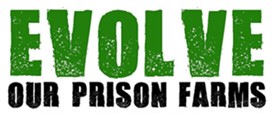Media Release
9 November 2017
Rehabilitation through Empathy and Ecological Stewardship: The Evolution of Canada’s Prison Farms
KINGSTON, ONTARIO – While the Trudeau government hashes out its plan to restore the federal prison farm program, a new concept is taking root in Canadian consciousness: that animal agriculture is the wrong path to rehabilitating prisoners.
The Kingston-based coalition Evolve Our Prison Farms is calling for a shift from outdated models to more sustainable agricultural practices and compassion-based rehabilitative programming. The combination of plant-based agriculture and farmed animal sanctuary (the permanent, non-exploitative care of animals) represents a forward-thinking alternative to the dairy and meat operations of the past.
Support for the Evolve campaign is growing rapidly as Canadians intuitively recognize the therapeutic merits of sanctuary and ecological stewardship, and the conflicts inherent in animal agriculture as a rehabilitative model.
A “Save the Herd” petition calling for sanctuary for Kingston’s famous “Pen Herd” cows has garnered over 8,000 signatures. Signatories have expressed concern, disbelief and outrage at the thought of involving prisoners in the exploitation and slaughter of animals – necessary elements of the dairy industry.
Inmates at one Kingston prison continue to be trained in an on-site slaughterhouse, raising serious questions about the nature and quality of our rehabilitative programming.
Social consciousness, particularly in Canada, is increasingly focused on greater protections for animals and urgent action on climate change. Prime Minister Trudeau has emphasized that major changes are needed at the local and national level if Canada is to meet its Paris Accord commitments.
Animal agriculture has been highlighted by the United Nations as having a “very substantial contribution” to climate change in a report titled Livestock’s Long Shadow.
“I agree that a good environmental case could be made that cows and other ruminants should not be part of the farm program,” says climate change solutions expert Dr. David Layzell. “The focus should be on plant production.”
The old model is also incongruous with revisions to Canada’s Food Guide, which will advocate a major shift away from animal protein to plant-based diets.
It would be a political error for the Canadian government to recommend a shift to plant-based diets for health and environmental reasons, while simultaneously promoting a form of agriculture that is a predominant cause of climate change, and dietary choices that contribute to preventable illness.
For most Canadians, however, the real perplexity comes at the thought of prisoners being trained to care for cows while being taught that it is acceptable to harm, coerce and kill them.
This creates what sociologists refer to as the “care-kill” paradox, which leads to high rates of moral ambivalence, cognitive dissonance and psychological disorder amongst workers in animal use industries.
Dr. Amy Fitzgerald of the University of Windsor endorses a prison sanctuary model. Specializing in green criminology, violence, and critical animal studies, Dr. Fitzgerald has “had concerns about the use of incarcerated populations in animal agriculture for years. It is not the type of work that we should be training inmates to do.”
“I therefore strongly recommend that animals only be incorporated in correctional environments in a manner that fosters empathy for them (such as animal sanctuary programs) and not through animal agriculture, which by design serves to objectify and truncate empathy.”
– 30 –
